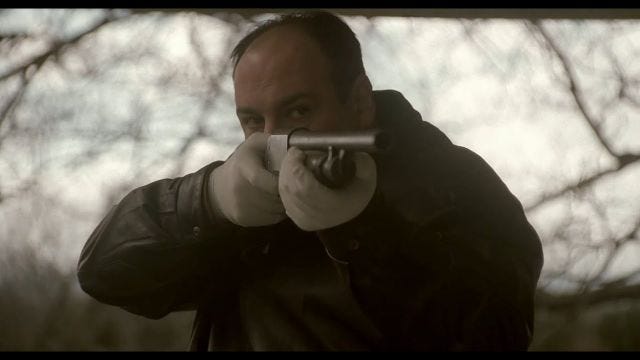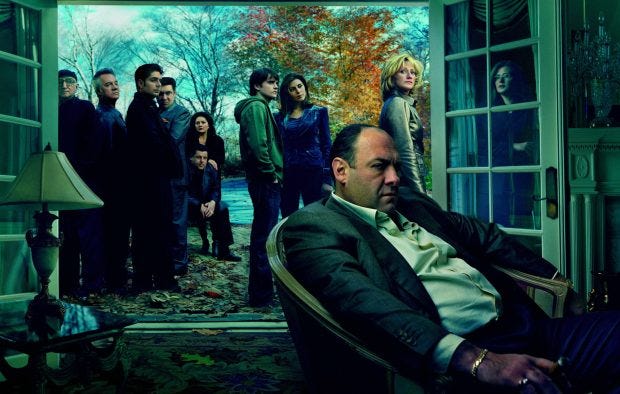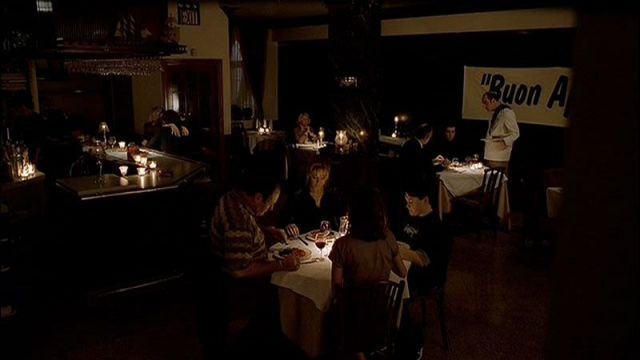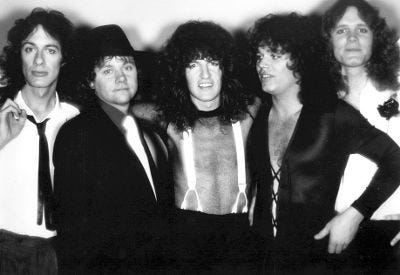Volume 2, Issue 41: Broadway Danny Rose
It was June 2004, and I had decided I'd had just about enough of New York and what tiny, jagged fragments of a career I supposedly had. I'd lived in the city for nearly five years and hadn't made a dent in the writing world. I had a dull day job as a terrible financial journalist for a monthly magazine about stockbrockers, I couldn't drum up any freelance work, The Black Table was a blast but not particularly (or even remotely) well-read, and I spent most of my weekends doing readings in Brooklyn for rows and rows of empty tables. I was about to turn 30 years old, out of college nearly a decade, and I had nothing to show for it but a crippling nicotine addiction, some equally frustrated friends and an apartment I was having an increasingly difficult time paying my share of the rent for.
So, like many young dreamers who had crapped out in New York before me, I decided to quit. What was the point of this? Why was I putting myself through all this? I had gone to New York to see if I could find an audience for my writing, and after five years, the city had told me rather clearly that there wasn't one. I talked to my friends from college Mike and Joan, who were having the time of their lives living by Wrigley Field, about finally doing what they'd been trying to convince me to do for years: Just move to Chicago. I would have friends there already, I could get back home to Mattoon easily, and, mostly, it would just be easier. New York was too hard. New York wanted me to leave.
I went to visit Mike and Joan in Chicago for a long weekend, and by the end of a few days in that gorgeous city, I'd essentially decided: I'm gonna do it. I'd miss A.J. and Aileen and Greg and Lindsay and Bruno and all my New York friends, but I was ready to stop kidding myself and start getting serious about my life, enough of these youthful fantasies. Before I went back to New York, though, I wanted to talk it over with my parents; they had supported the fantasy for so long, in the face of all reason, that I felt I owed them the moment I told them I was finished. So I called them from Chicago, with a quick and easy excuse for a quick overnight visit: The season finale of "The Sopranos" was that Sunday. I knew they'd be home. I knew everybody would be home.

This was Season Five of "The Sopranos," the one where the overarching plotline is Steve Buscemi screwing everything up, though the episode from that season that will live forever is the one where poor Adriana gets killed. (I am still so upset by that episode that I find it impossible to watch Drea de Matteo in anything anymore. Just seeing her gets me sad.) I knew my parents would be watching, because everyone I knew would be watching. "The Sopranos," particularly by Season Five, was a show, the show, that you planned your entire week around. There were parties I'd been invited to, dates I could have gone on, old friends I could have seen, career opportunities that I should pursued, all of which I eagerly skipped because it was Sunday night, and Sunday night was Sopranos Night. If my parents hadn't have been watching that night, frankly, I probably just wouldn't have gone. It was the season finale, after all.
That was the thing with "The Sopranos," which is having a moment this week, thanks to the 20th anniversary of its first-ever episode (!!!!!) and the new, fantastic book The Sopranos Sessions, by my New York colleague Matt Zoller Seitz and my old internet friend Alan Sepinwall. (If you are even slightly Sopranos-fan-adjacent, the book is an absolute must.) During the 13 weeks that "The Sopranos" was in season, every episode, every Sunday night, was an absolute event. You planned your whole week around them, and, during particularly eventful episodes, you took note of where you were and who you were watching them with, because you knew it would be something you wouldn't forget.
And I haven't. I watched the Adriana death episode with my friend Jami at her apartment in Brooklyn; we looked at each other at the end, said "holy shit' and then I left, both of us silent for what I presume was several days. I watched "Join the Club," the one after Tony was shot by his uncle where he dreams he's a traveling salesman named Kevin Finnerty, at my friend Aileen's place in Astoria; we ordered a pizza that came, late, halfway through the episode, and I nearly screamed at the delivery guy. I watched "Sopranos Home Movies," the first episode of Season Six, Part Two, the first of the final eight episodes, at my new apartment in Brooklyn, an unofficial housewarming party for my theoretical bachelor pad; I actually had the thing catered by a local pasta place. I watched "The Blue Comet," the penultimate episode, with four close friends who were as obsessed as I was; as with all episodes, we sat, motionless and silent, for the entire episode. Nobody looked at their phones, nobody talked, nobody even went to the bathroom. It was as close as many of us had to church. You were probably the same way.
The finale, though, I watched by myself, alone, in my apartment, the way you watch your team play in the Super Bowl, by yourself, because you want to feel free and unashamed to react however you want to without worrying what anyone will think about you. It was too important to experience in any other way than hushed, pious solitude.

Much has been discussed in the last week of how we don't watch television like this anymore, that appointment viewing has been replaced by a la carte streaming, of binge-watching as a solo activity on one's own schedule. There are so few collective experiences anymore, things we all gather around and discuss together because we all went through it; today, it's basically just sporting events, award shows and Trump shit. This is all true, and it's something to lament. We shouldn't be surprised that we find it so difficult to find common ground with people who aren't exactly like us when we have so few shared common experiences. Your reality is literally different than mine. No wonder we can't agree on anything.
But those are sociopolitical and changing cultural landscape discussions, which are important, but beside the point. "The Sopranos" was a brilliant show -- is a brilliant show; I've been rewatching it while following along with Sepinwall's and Zoller Seitz's book, which has chapters on each episode, and if anything it has only gotten richer and more relevant -- independent of the media environment in which it was created. It's a touchstone show, a groundbreaker, a foundational document that was actually worthy of all the praise we heaped on it. We were thunderstruck because partly it took us by surprise and because it ushered in a new era of how we consumed our entertainment. But we were mostly thunderstruck because it was so great. It was something that everyone watched: Your current friends, your college friends, your high school friends, your co-workers and, yes, even your parents. They hadn't discovered email yet, or blogs, or Facebook. But they knew this. Everybody wanted to be a part of this.
That night, in June 2004, I sat in my parents' den and watched "All Due Respect," the season finale of Season Five, when Tony shoots Tony B, when the feds arrest Johnny Sack, when Tony throws his gun in the snow and scrambles desperately away. We shared a bottle of wine, and then we sat quietly for a few minutes before we talked about the episode, what had happened, what it all meant, when the show was returning, all the great moments from season's past. Above my dad's bar downstairs hung the framed Sopranos poster I'd gotten him for Christmas the year before; I'd buy him the DVD set every year, and he'd rewatch them over and over. It was a fantastic episode, and when we were done talking about it, I told them what I'd come to tell them, that I had come to the decision that I should probably leave New York, that I should probably find a real job, that I was getting too old to still be bashing my head against the wall like this. Mom poured me another glass of wine, and Dad frowned. "If that's what you really want to do, you should," he said. "But are you sure you really want to quit? We support whatever you want to do. But I don't think you're actually ready to quit." And in that moment, I knew he was right: I wasn't.
Nearly three years later, I was back in Mattoon again, this time having finally turned a corner, work-wise. Deadspin had launched 18 months earlier, the break I'd been waiting my entire adult life for, and I'd just turned in the manuscript that would become God Save the Fan, my third, and still most successful, book. I'd just signed a deal to write a daily column for The New York Times that October about the baseball playoffs. My career, at last, had gotten going. I hadn't quit, largely thanks to that night three years earlier, when my parents and I used "The Sopranos" as an excuse to sit down and talk to one another. This night, in May 2007, we watched "Kennedy & Heidi," the one where Tony and Christopher get in that fateful car accident, and we sat, aghast, in same same dark den, drinking wine, experiencing it in real time together. When it was over, we talked about the last time we'd watched "The Sopranos" together, but we didn't talk about my career turnaround, or my dad's advice, or how I almost gave up. We just talked about that episode, about Tony B, about Johnny Sack, about how great that episode was, about how much fun we'd had watching it. "The Sopranos" is my favorite television show of all time. But its quality will always just be a part of it. My only regret is all those episodes I watched alone. Someday soon, you're gonna have families of your own. And if you're lucky, you'll remember the little moments. Like this. That were good.

Here is a numerical breakdown of all the things I wrote this week, in order of what I believe to be their quality. You may disagree. It is your wont.
1. Urban Meyer Does Not Deserve His Triumphant Final Hurrah, NBC News. This piece is actually 10 days old. I just forgot to include it here last week.
2. The Existential Peril of College Football Players Skipping Bowl Games, New York. You may have heard me discussing this one on NPR's "Only a Game" this morning.
3. What Are the Reds Up To? MLB.com. If the Reds aren't going to be the sacrificial lambs I had grown accustomed to, I do not know what I will do.
4. Debate Club: Worst Sci-Fi/Genre Remakes, SYFY Wire. Ha, Gus Van Sant's Psycho. Still so weird.
5. 2019 College Football Tortured Fanbase Rankings, Medium. The No. 1 spot should hold for a while.
THE WILL LEITCH SHOW

We're on hiatus until February! Get caught up with the ones you missed on Amazon or on SI TV.
PODCASTS
Grierson & Leitch, first show of 2019 is up Sunday night, but go listen to Dorkfest: Best Movies of 2018 if you haven't yet.
Waitin' Since Last Saturday, no show, taping next week.
Seeing Red, no show, taping Monday.
ONGOING LETTER-WRITING PROJECT!
I have gotten so obsessed with this project that I have started dropping by the post office every day. They must think I'm casing the joint. Anyway, write to me. I am specifically waiting on your letter.
Will Leitch
P.O. Box 48
Athens GA 30603
CURRENTLY LISTENING TO

"Keep On Loving You," REO Speedwagon. The pride of Champaign, Illinois! I did a piece for New York about REO Speedwagon a few years ago -- I ended up doing a reading of this piece that was covered in The New Yorker, in case you were wondering how stupid the world was 10 years ago -- and I tried to pretend that my enjoyment of REO Speedwagon was ironic and arch, but it is not, it absolutely is not. Also, somebody buy me Kevin Cronin's outfit in that picture.
This is my final weekend before the travel starts to get intense again, so I will be spending it trying to make sure my children remember my face in the coming months. Be safe out there.
Best,
Will

